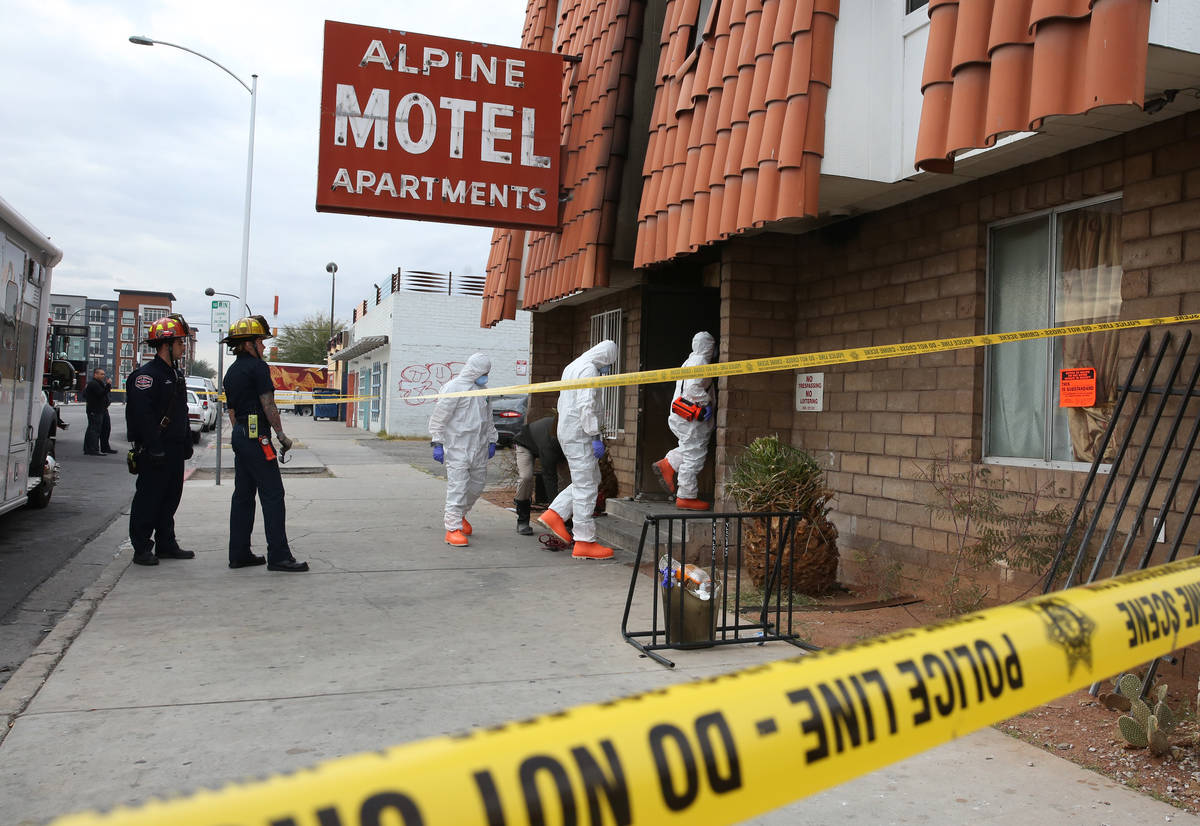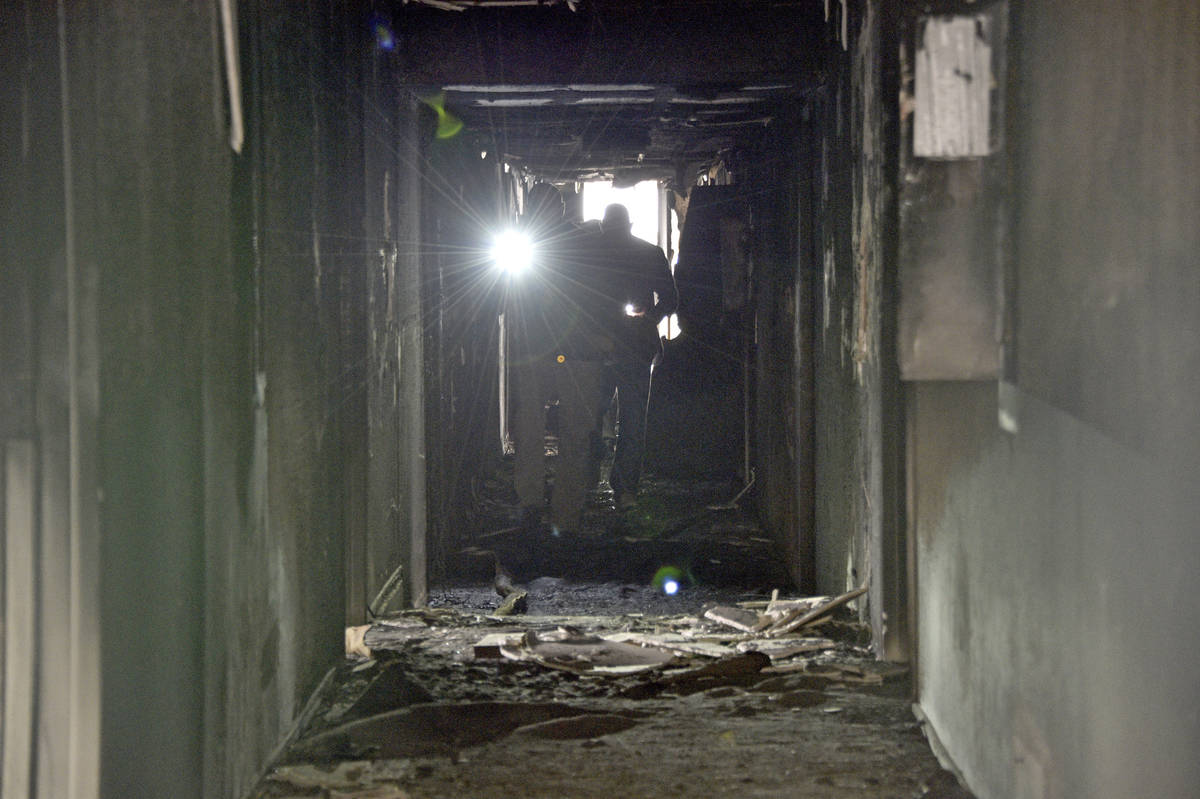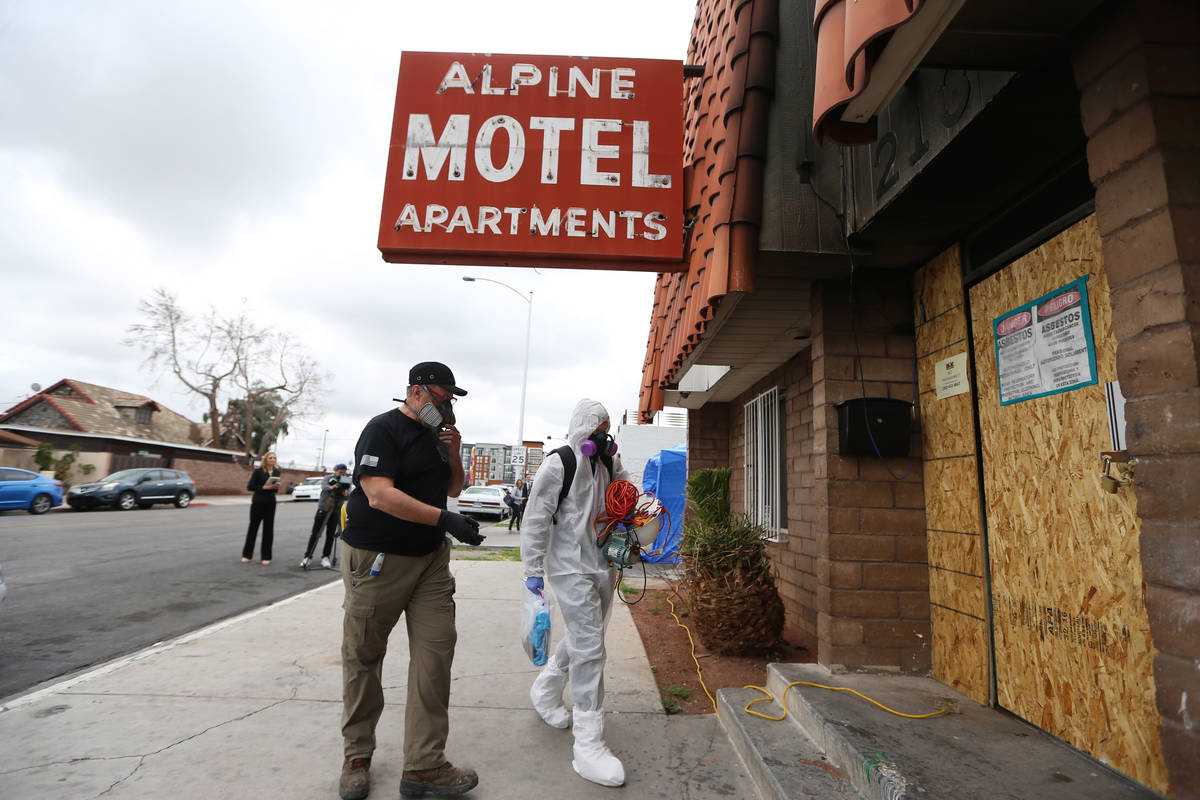Las Vegas considering swifter action, penalties for dangerous apartments
Aging Las Vegas apartment buildings and extended-stay hotels with a history of code violations would face tougher enforcement under new proposals the city council will consider Wednesday.
The proposed reforms were spurred by the deadly December fire at the downtown Alpine Motel Apartments that killed six people and injured 13 more.
The program would expand on a city program launched in August 2017 designed to reduce residential fire fatalities, and would home in on dangerous aging properties, which often serve low-income tenants and lack modern fire safety equipment.
“We are being far more proactive than really any other program, focusing on units that have a higher risk,” Las Vegas chief sustainability officer Tom Perrigo said. “That really is a complete, fundamental change in how we do our business.”
The changes come after Review-Journal investigations showed the Alpine had a history of failed inspections that spanned more than a decade, and that it had not been inspected for more than two years leading up to the deadly fire. Records show Las Vegas police tried to shut down the property as a chronic nuisance three years before the fire, but city officials opposed the action.
In the two days following the December fire, inspectors also found 42 fire code violations at the Alpine.
Wednesday’s resolution would also expand the existing city program to include fourplexes, adding about 1,110 more buildings into its purview, city spokesman Jace Radke said. The program currently applies to only apartment buildings with five or more units.
The council will also need to approve changes to city code at future meetings to implement some parts of the plan.
Since 2015, apartment fires have killed 16 people in parts of Las Vegas with older buildings, the city reports. Older residential buildings pose a greater risk for fatal blazes because Nevada law does not require them to adhere to new safety upgrades required under fire codes adopted after the building is constructed.
The Alpine, for example, was built in 1972 and did not have a sprinkler system.
The reforms wouldn’t require that new safety equipment be installed in older buildings — that would require action by state lawmakers — but they would give landlords less time and fewer warnings to fix issues before facing fines and penalties. Fourplexes would also need to become licensed with the city.
For example, landlords would be required to fix dangerous issues, such as broken air-conditioning systems or fire safety violations, at their properties within 24 to 48 hours. Otherwise, the city could make the repairs and charge the landlord for them. The city would also vacate the properties until the repairs are made and assist renters in temporarily relocating.
Landlords would have 30 days to fix issues that are not deemed dangerous.
Once a year, city officials will analyze a combination of code enforcement, fire prevention and police data to identify problem properties. All properties in the program will receive a routine inspection at least once every five years, and properties identified as having severe issues will receive one to two routine inspections each year.
The proposed reforms have the support of the Nevada State Apartment Association, executive director Susy Vasquez said.
“The city was able to craft a really good resolution that really kind of drills down to the properties that really need a little more oversight than just any regular apartment complex,” she said.
The resolution also sets the stage for council members to later close a loophole in city law that exempts extended-stay hotels like the Alpine from city housing standards. The city has identified 26 such hotels, which often act as permanent housing for low-income tenants, to include in the program.
The city would inspect extended stay hotels at least once a year. Problem properties could receive as many four regular inspections a year under the program.
Landlords who don’t fix their properties could face penalties as high as $500 per day. That amount could be up to $1,000 per day for commercially zoned properties, like extended-stay hotels.
The proposal was previously planned to come before the city council in May, but Perrigo said it was delayed because of Nevada’s outbreak of the new coronavirus.
He said the proposed hotel inspection program was modeled after a similar program that launched in Reno last year.
That program has spurred some owners to sell their properties, but many have gone “above and beyond” the standards set by the program, said Alex Woodley, Reno’s assistant director of neighborhood services.
“They spent more than what was required,” Woodley said. “They probably started realizing ‘we’re being held accountable to invest in our property and maintain our property.’ ”
Perrigo said he expects that Las Vegas’ program will have a similar effect on problematic landlords here.
“They’re either going to change their business model or move on,” he said.
Contact Michael Scott Davidson at sdavidson@reviewjournal.com or 702-477-3861. Follow @davidsonlvrj on Twitter.
Las Vegas: Multi-Family Risk Reduction Program by Las Vegas Review-Journal on Scribd

























